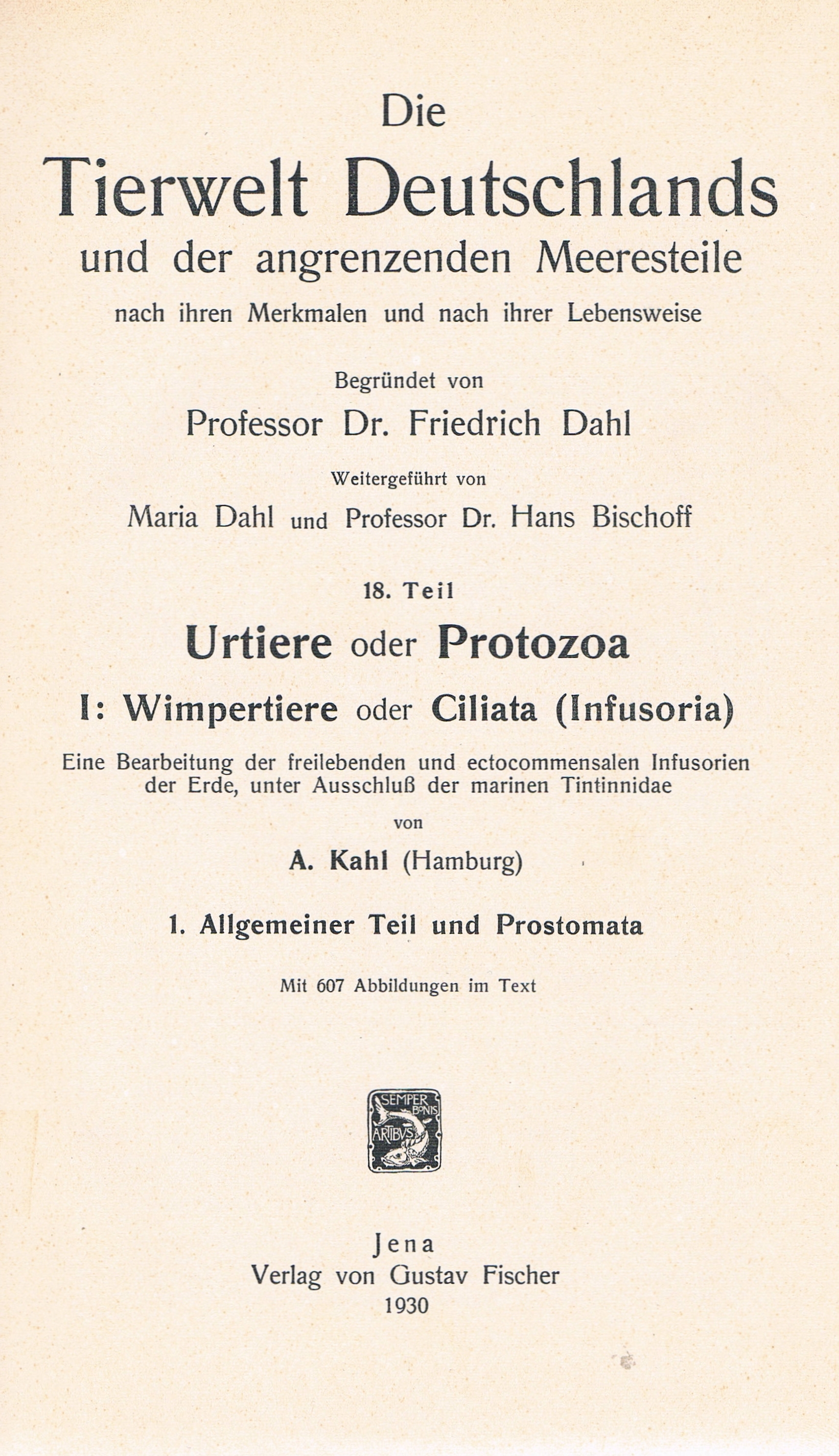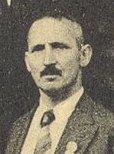|
Alfred Kahl
Alfred Detlef Fritz Kahl (18 February 1877 – November, 1946) was a German schoolteacher who took up microscopy in mid-life and became a leading authority on ciliated protozoa. In a burst of scientific productivity that lasted just nine years, he published 1800 pages of scholarly work, in which he described 17 new ciliate families, 57 genera, and about 700 previously unknown species. During his brief career as a protozoologist, he redescribed and illustrated nearly all the species of ciliates known in his time, and fit them into a taxonomic scheme that remains influential today.Foissner, Wilhelm. Life and Legacy of an Outstanding Ciliate Taxonomist, Alfred Kahl (1877-1946), Including a Facsimile of his Forgotten Monograph from 1943. Acta Protozoologica 2004 (Suppl.) 43: 1-69Corliss, John O. A Salute to Fifty-Four Great Microscopists of the Past: A Pictorial Footnote to the History of Protozoology. Part II. Transactions of the American Microscopical Society. 98: 1 (Jan, 1979), pp. ... [...More Info...] [...Related Items...] OR: [Wikipedia] [Google] [Baidu] |
Warwerort
Warwerort is a municipality in the ''Amt'' ("collective municipality") Büsum-Wesselburen in the district Dithmarschen in Schleswig-Holstein, Germany. Warwerort is located along the north coast of the Meldorf Bight east of Büsum and Büsumer Deichhausen. The name is a combination of the old village of ''Werven''/''Warven'' and ''Ort'' (place). Werven originally was located south of Warverort and depicted on maps of the island Büsum as early as 1559. It sank completely during devastating storm tides in 1717 and 1718. The ''Wehl'' behind the dike in Warwerort serves as another flood reminder. It formed where the sea washed out the soil after a dike break and left a brackish lake on the landside of the dike. Warwerort's harbor became dysfunctional when the dike around the Speicherkoog (build between 1969 and 1978) to the southeast blocked its access to the North Sea The North Sea lies between Great Britain, Norway, Denmark, Germany, the Netherlands and Belgium. An epeiric ... [...More Info...] [...Related Items...] OR: [Wikipedia] [Google] [Baidu] |
Bernhard Nocht Institute For Tropical Medicine
Bernhard Nocht Institute for Tropical Medicine (Bernhard-Nocht-Institut für Tropenmedizin) (BNITM) in Hamburg is Germany's largest institution for tropical medicine, with a workforce of about 250 people in Hamburg. It is member of the Leibniz-Association. History The cholera epidemic of the year 1892 claimed thousands of lives and prompted the Senate and Parliament of the City of Hamburg to reform the health care system. The Tropical Medicine Institute was founded with the support of the Imperial Government to research ship and tropical diseases and to train ship and colonial physicians. In 1893, the naval physician was introduced to the newly created position of port physician. For the medical care of seamen suffering from internal diseases, he was also given a department in the St. Georg General Hospital. Contrary to the plans of the bacteriologist Robert Koch, Nocht established Hamburg in 1899 as the location for an institute for the research of tropical diseases, since "d ... [...More Info...] [...Related Items...] OR: [Wikipedia] [Google] [Baidu] |
1946 Deaths
Events January * January 6 - The first general election ever in Vietnam is held. * January 7 – The Allies recognize the Austrian republic with its 1937 borders, and divide the country into four occupation zones. * January 10 ** The first meeting of the United Nations is held, at Methodist Central Hall Westminster in London. ** ''Project Diana'' bounces radar waves off the Moon, measuring the exact distance between the Earth and the Moon, and proves that communication is possible between Earth and outer space, effectively opening the Space Age. * January 11 - Enver Hoxha declares the People's Republic of Albania, with himself as prime minister. * January 16 – Charles de Gaulle resigns as head of the French provisional government. * January 17 - The United Nations Security Council holds its first session, at Church House, Westminster in London. * January 19 ** The Bell XS-1 is test flown for the first time (unpowered), with Bell's chief test pilot Jack Woolams at t ... [...More Info...] [...Related Items...] OR: [Wikipedia] [Google] [Baidu] |
1877 Births
Events January–March * January 1 – Queen Victoria is proclaimed ''Empress of India'' by the ''Royal Titles Act 1876'', introduced by Benjamin Disraeli, the Prime Minister of the United Kingdom . * January 8 – Great Sioux War of 1876 – Battle of Wolf Mountain: Crazy Horse and his warriors fight their last battle with the United States Cavalry in Montana. * January 20 – The Conference of Constantinople ends, with Ottoman Turkey rejecting proposals of internal reform and Balkan provisions. * January 29 – The Satsuma Rebellion, a revolt of disaffected samurai in Japan, breaks out against the new imperial government; it lasts until September, when it is crushed by a professionally led army of draftees. * February 17 – Major General Charles George Gordon of the British Army is appointed Governor-General of the Sudan. * March – ''The Nineteenth Century (periodical), The Nineteenth Century'' magazine is founded in London. * Marc ... [...More Info...] [...Related Items...] OR: [Wikipedia] [Google] [Baidu] |
Infusoria
Infusoria are minute freshwater life forms including ciliates, euglenoids, protozoa, unicellular algae and small invertebrates. Some authors (e.g., Bütschli) used the term as a synonym for Ciliophora. In modern formal classifications, the term is considered obsolete; the microorganisms previously included in the Infusoria are mostly assigned to the kingdom Protista. Aquarium use Infusoria are used by owners of aquaria to feed fish fry; because of its small size it can be used to rear newly hatched fry of many common aquarium species. Many home aquaria are unable to naturally supply sufficient infusoria for fish-rearing, so hobbyists may create and maintain their own supply cultures or use one of the many commercial cultures available.Sharpe, Shirlie (December 22, 2018)"How to Culture Your Own Infusoria at Home" The Spruce Pets. Retrieved August 28, 2019. Infusoria can be cultured by soaking any decomposing vegetative matter such as papaya skin in a jar of aged (i.e., chlorine-fr ... [...More Info...] [...Related Items...] OR: [Wikipedia] [Google] [Baidu] |
Friedrich Dahl
Karl Friedrich Theodor Dahl (June 24, 1856 in Rosenhofer Brök north of Dahme, Holstein – June 29, 1929 in Greifswald) was a German zoologist, and in particular an arachnologist. The son of a farmer, Dahl studied at the universities of Leipzig, Freiburg, Berlin and Kiel. His dissertation (1884) was "''Beiträge zur Kenntnis des Baus und der Funktion der Insektenbeine''". He became a '' Privatdozent'' in 1887; with a habilitation thesis "''Ueber die Cytheriden der westlichen Ostsee''". Around this time he traveled to the Baltic states and (1896–1897) to the Bismarck Archipelago near New Guinea. He was also interested in biogeography. On April 1, 1898 Dahl became curator of arachnids at the ''Museum für Naturkunde'' in Berlin, where he worked under his former teacher, the then museum director Karl Möbius. Dahl remained in Berlin until he retired, and his type collection is held in that museum. Although he described in many animal groups, Dahl concentrated on spider ... [...More Info...] [...Related Items...] OR: [Wikipedia] [Google] [Baidu] |
Kahl -- Euplotes Harpa And Extensum
Kahl may refer to: Places * Kahl am Main (officially german: Kahl a. Main), a community in the Aschaffenburg district in the Regierungsbezirk of Lower Franconia * Kahl (river), a river in the northern Spessart in Bavaria and Hesse * Kleine Kahl ("Little Kahl"), a left tributary of the Kahl in the northern Spessart in Lower Franconia, Bavaria * Sommerkahl (Kahl), a left tributary of the Kahl in the northern Spessart in Lower Franconia, Bavaria People * Alfred Kahl German ciliate taxonomist (1877–1946) Other *Kahl (surname) * Kahl Nuclear Power Plant, the first nuclear power plant ever to be built in Germany * ''Kahl'' (film), a 1961 short German documentary film. It was nominated for an Academy Award for Best Documentary Short References * Kahl Building (also known as Capitol Theatre), a building in Downtown Davenport, Iowa, USA Media * KAHL (AM), a radio station (1310 AM) licensed to serve San Antonio, Texas, United States * KAHL-FM, a radio station (105.9 FM) licensed to ser ... [...More Info...] [...Related Items...] OR: [Wikipedia] [Google] [Baidu] |
Eduard Reichenow
Johann Eduard Reichenow (7 July 1883 – 23 March 1960) was a German protozoologist. He was the son of ornithologist Anton Reichenow. Biography Reichenow was born in Berlin. He studied natural sciences in Heidelberg, Berlin and Munich, and received his doctorate in 1908. After graduation he conducted research of protozoans at the Imperial Health Ministry in Berlin. From 1913 onward, he served as a government zoologist in Kamerun, where he did studies on the biology of the malaria pathogen. From 1916 to 1919 he conducted research at the ''Museo Nacional de Ciencias Naturales'' in Madrid, and in 1921 was appointed director of the protozoology department at the '' Schiffs- und Tropenkrankheiten'' in Hamburg. During the same year, he received his habilitation from the University of Hamburg and in 1925 obtained the title of professor. He was an editor of the journals: ''Zeitschrift für Tropenmedizin'', the ''Zentralblatt für Bakteriologie'' and the ''Zeitschrift für Parasitenk ... [...More Info...] [...Related Items...] OR: [Wikipedia] [Google] [Baidu] |
Germany
Germany,, officially the Federal Republic of Germany, is a country in Central Europe. It is the second most populous country in Europe after Russia, and the most populous member state of the European Union. Germany is situated between the Baltic and North seas to the north, and the Alps to the south; it covers an area of , with a population of almost 84 million within its 16 constituent states. Germany borders Denmark to the north, Poland and the Czech Republic to the east, Austria and Switzerland to the south, and France, Luxembourg, Belgium, and the Netherlands to the west. The nation's capital and most populous city is Berlin and its financial centre is Frankfurt; the largest urban area is the Ruhr. Various Germanic tribes have inhabited the northern parts of modern Germany since classical antiquity. A region named Germania was documented before AD 100. In 962, the Kingdom of Germany formed the bulk of the Holy Roman Empire. During the 16th ce ... [...More Info...] [...Related Items...] OR: [Wikipedia] [Google] [Baidu] |
Hamburg
(male), (female) en, Hamburger(s), Hamburgian(s) , timezone1 = Central (CET) , utc_offset1 = +1 , timezone1_DST = Central (CEST) , utc_offset1_DST = +2 , postal_code_type = Postal code(s) , postal_code = 20001–21149, 22001–22769 , area_code_type = Area code(s) , area_code = 040 , registration_plate = , blank_name_sec1 = GRP (nominal) , blank_info_sec1 = €123 billion (2019) , blank1_name_sec1 = GRP per capita , blank1_info_sec1 = €67,000 (2019) , blank1_name_sec2 = HDI (2018) , blank1_info_sec2 = 0.976 · 1st of 16 , iso_code = DE-HH , blank_name_sec2 = NUTS Region , blank_info_sec2 = DE6 , website = , footnotes ... [...More Info...] [...Related Items...] OR: [Wikipedia] [Google] [Baidu] |



